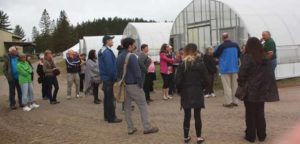Thessalon First Nation Bio-Centre to take on new services

By Leslie Knibbs
THESSALON FIRST NATION — As a result of a partnership between Thessalon First Nation (TFN) and Niigaaniin Services of the North Shore Tribal Council (NSTC), the TFN Bio-Centre will take on a new life servicing all Indigenous people in the Robinson Huron Treaty Area.
Elizabeth Richer, Director of Niigaaniin Services, estimates there are 5,000 members on-reserve in addition to 15,000 who live off-reserve.
The TFN Bio-Centre was originally owned and operated by the Ministry of Natural Resources and Forestry (MNR); it closed in 1997. The property was rented out the following year and then sat vacant for two years. In the year 2000, TFN purchased the property with intentions to grow Alfalfa sprouts; the Alfalfa project was unsuccessful. Thessalon next took on the job of growing tree seedlings, which the MNR had been doing prior to the sale with annual peak production of 1.5 million seedlings planted. According to Jukka Heikurinen, a historian for the site, the original operation goes back to the Second World War when the property was a prisoner of war camp where prisoners “played a major role in tending the forests.” Heikurinen called the area the greenhouse sits in, “quite valuable and the most productive forest in North Ontario.”
Indeed, the land the centre sits on is productive with 80 acres of farmlands as well as 16 greenhouses and cold storage facilities. In addition, the facility houses a certified organic food processing and packaging area. Richer is confident the centre will fulfill and deliver much-needed services to the member First Nations of the NSTC.
“We are trailblazing a new way to deliver holistically, wrap-around social services to our community members. This is an ambitious pursuit of Mino Bimaadizidaa (living well together), but very achievable, very soon with this partnership,” she said in a recent press release.
Namaweswen, NSTC has invested over $1 million dollars into a complete retrofit of the greenhouses with intentions to grow and distribute healthy foods to Nutrition Cupboards in the North Shore Communities and off-reserve populations through the Indigenous Friendship Centre location in Elliot Lake, Ontario. The site will be ready to produce healthy fruits, traditional medicines, and vegetables for all Indigenous people in the Robinson Huron Treaty Area in 2023. Yet, the project is not inclusive of just providing nourishing food.
Niigaaniin Services will establish the site of the centre as a regional hub to deliver services in a holistic manner from the start of a person’s healing journey including Land-Based Detox Program and family support programs.
“Niigaaniin Services consults with community members on the North Shore regarding their wants and needs and develop programming based on what is shared. Along with Food Security and Land-Based treatment, the site will offer community members a safe, community-based place to live and work for as much time as needed as part of their recovery and aftercare journey.”
Perhaps one of the most innovative aspects of the repurposing of the Bio-Centre is Niigaamiin’s offer of an alternative to custody for criminal courts to consider at a sentencing hearing following a Gladue Report on the individual.
“It is well-known that Indigenous peoples are grossly over-represented in the current prison population in Ontario and Canada,” Dorothy Coad, a manager with Niigaaniin in the Mental Health and Addictions area, said recently. “We have lived experience working with individuals that are in the criminal justice system that simply have nowhere to go and are in and out of jail receiving no treatment and no healing. If we can create a space to offer culturally-safe recovery and healing, we can make sustainable change for Indigenous people.”
In recent years with the Gladue principles being used in sentencing an Indigenous person, the Canadian government has clearly stated an understanding with Coad’s statements.
“Programs and resources are needed in every stage of the criminal justice process to meaningfully implement Gladue principles: from court workers who prepare pre-sentence information for judges, to alternate sentencing processes that operate in accordance with Indigenous legal tradition to community-based alternatives to incarceration both on reserves and in urban centres.”
Assistant to Director Elizabeth Richer, Erik Bringleson, estimates the retrofitting of the bio-centre will begin in this month with greenhouse production starting in February 2023.


